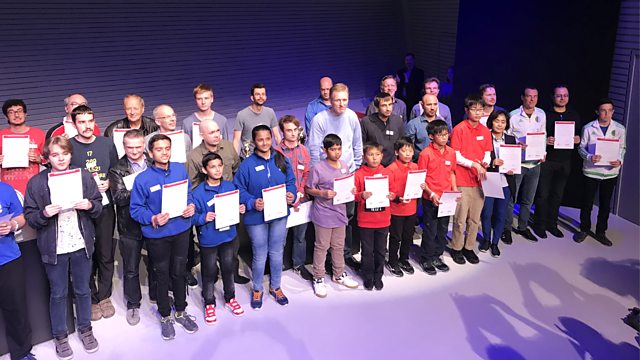Maths perpetrator Alex Bellos has been on Radio 4 again, this time meeting some of the competitors in the Mental Calculation World Cup, which is held annually in Germany. It went out on Radio 4 last night, and will be repeated again next Monday at 9pm, plus you can listen online.
You're reading: Posts Tagged: radio
Naked Scientists on the Clay Millennium Prize Problems, f. Katie Steckles
The Naked Scientists Podcast has released an episode on the Clay Millennium Prize Problems, titled ‘The Seven Million Dollar Maths Mystery’. The episode description is:
This week, we’re investigating the Millennium Prize Problems – a set of mathematical equations that, if solved, will not only nab the lucky winner a million, but also revolutionise the world. Plus, the headlines from the world of science and technology, including why screams are so alarming, how fat fish help the human fight against flab, and what’s the future of money?
Better yet, the episode includes a contribution from our very own Katie Steckles talking topology, Poincaré and Perelman.
The episode is available to listen or download as a podcast or, less conveniently, at 5am tomorrow on Radio 5 Live (or later on iPlayer). Not a listener? Read a transcript.
How to Teach Maths by Alex Bellos on Radio 4
Media math-man Alex Bellos has made another programme for BBC Radio 4, this time about How to Teach Maths.
Alex Bellos takes you on a mathematical learning journey from the first stages of number recognition through to an understanding of how children solve sums and calculate answers. On the way he will look at the neuroscience of maths and how our mathematical brain develops. He investigates the scientific evidence behind teaching maths and he’ll compare how modern methods of teaching children differ from those taught to their parents, helping kids today go beyond basic numeracy to develop a passion for numbers.
By the way, Radio 4 have also been repeating Marcus du Sautoy’s enjoyable A Brief History of Mathematics at a quarter to two each afternoon. That’s also available to listen to on the Radio 4 website.
Listen: How to Teach Maths on BBC Radio 4.
A History of Britain in Numbers
Somehow all three of us missed this before it started: “Andrew Dilnot, chair of the UK Statistics Authority, brings to life the numbers that highlight the patterns and trends that have transformed Britain”. A History of Britain in Numbers is a series of ten 15 minute programmes broadcast on BBC Radio 4. It looks like someone at the BBC has decided to extend the very popular A History of the World in 100 Objects format to a family of series A History of X in Y.
Dilnot was the first presenter of the long-running series More or Less, an Aperiodical favourite.
More information
Listen: A History of Britain in Numbers at BBC Radio 4, or the Omnibus programme containing the first five episodes, or the podcast of the whole series.
You’ll almost definitely also like More or Less.
via Tim Harford on Twitter.
Nirvana by Numbers
Alex Bellos has made another documentary for BBC Radio 4, this time about the number zero. It’s a pleasant bit of numerical tourism, as Alex travels to India to find the source of the number zero in a small shrine, with a diversion to talk about Vedic maths along the way.
You can listen to Nirvana by Numbers on the BBC iPlayer. It looks like it’s available indefinitely. If Alex has whetted your appetite for historical zeroes, the book Zero: The Biography of a Dangerous Idea by Charles Seife is a cracking read.
Listen: Nirvana by Numbers on BBC Radio 4.
Ian Stewart on The Life Scientific
Acknowledging the long-hidden truth that mathematicians are also scientists, Jim al-Khalili interviewed Ian Stewart yesterday for his Radio 4 programme, The Life Scientific. The show features a different scientist in each episode, and Professor al-Khalili talks to them about their life and work, what inspires and motivates them, and how their research may benefit mankind.
Professor Ian Stewart (not to be confused with geologist Professor Iain Stewart) is a professor at Warwick University, and is involved with a lot of maths outreach, including having written numerous popular maths books; he gave the Royal Institution Christmas Lectures in 1997. His research interests are in dynamical systems, bifurcations, pattern theory and biomathematics. He also writes science fiction books, and has collaborated on the Science of Discworld books, based on Terry Pratchett’s series.
Links
Listen again to the episode of The Life Scientific, originally broadcast 17/9/13 – available up to a week afterwards.
Podcast – available indefinitely.
Watch Tim Harford recording a new radio show about economics for the BBC
Come and see me record a brand new radio show about economics! dlvr.it/2YZlv6
— Tim Harford (@TimHarford) November 29, 2012
Fans of Tim Harford and his work on BBC Radio 4’s More or Less will be excited to learn he’s doing a new radio show about economics. In this post on his blog, he explains the show will be called ‘Pop Up Economics’, and consist of short stories about important people and ideas in economics.
The show is being recorded in the evening this coming Tuesday 4th December, in London, and if you’d like to go along, you can email popupeconomics@bbc.co.uk for tickets and details.
Via @TimHarford on Twitter.
